PayPay Corporation (hereinafter PayPay) is pleased to announce that its cashless payment service PayPay will be used as a payment method for donations to national university corporations and educational corporations. Beginning sequentially from October 2024, a total of nine universities, including National University Corporation The University of Tokyo (hereinafter The University of Tokyo) and Waseda University Educational Corporation (hereinafter Waseda University), will adopt PayPay as a payment method to make donations. With this, PayPay users can select the activities they wish to donate, such as research and education, and other activities that national university corporations and educational corporations disclose on their website and make donations *1 through PayPay.
*1. Only PayPay Money is accepted. Donations will not be eligible for the granting of PayPay Points, and will not be counted in the PayPay STEP program.
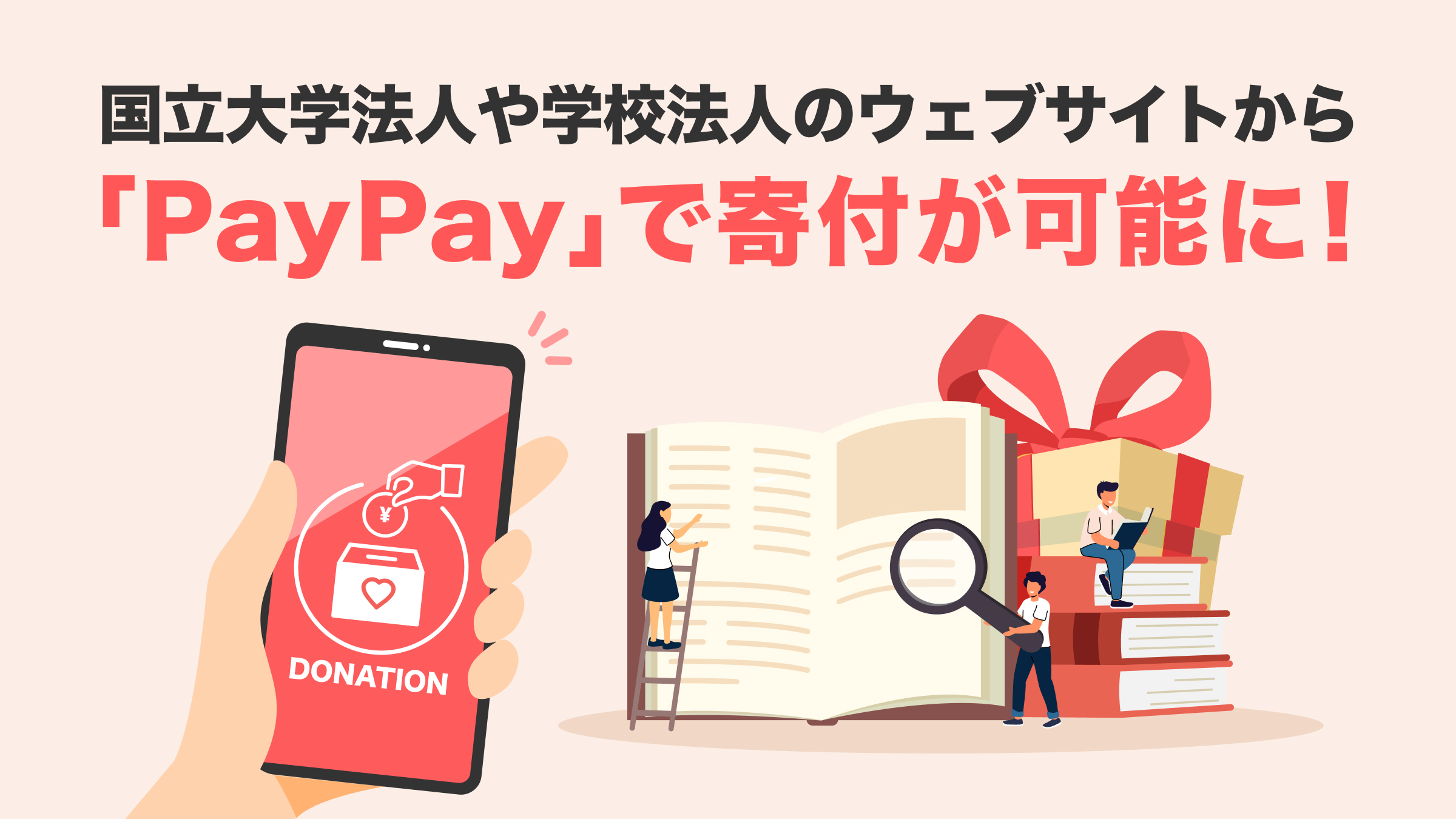
Since August 2024, organizations running donation services have been able to create a business account with PayPay to solicit donations. Now, the scope of business accounts has expanded to include national university corporations and educational corporations. A total of nine universities, including The University of Tokyo and Waseda University, will adopt PayPay as a payment method to make online donations, allowing them to solicit diverse donations—including funds for sports competitions, research, education, and support for students facing financial challenges—from both alumni and PayPay users.
To ensure that users can use PayPay with peace of mind, companies and organizations are required to undergo a rigorous screening process that includes a face-to-face corporate survey and confirmation of the status of their overseas support. Anti-fraud measures will be enhanced as well once collaborations begin, such as monitoring of suspicious transactions and confirming the status of donations that are made. Further information on companies and organizations eligible for online donations via PayPay will be provided in the service website as it becomes available.
Users are required to confirm their identity*2 (eKYC) to donate using PayPay. The donation can be completed by entering the desired amount on the website of the national university corporation or educational corporation and tapping “Send.” The initial transaction will require authentication by logging in to PayPay, but from the second time onwards, the donation can be completed in the respective university’s website without switching to the PayPay app screen in between. It should be noted that users will never receive a request from a national university corporation or educational corporation to send money. The donation limit is equivalent to PayPay’s remittance limit. For further details on how to use the service, please refer to the service page or websites of the respective national university corporation or educational corporation.
*2. As of November 2024, 32 million users have verified their identity (eKYC).
・Online donation guide: https://paypay.ne.jp/guide/donation/
<How to make a payment>
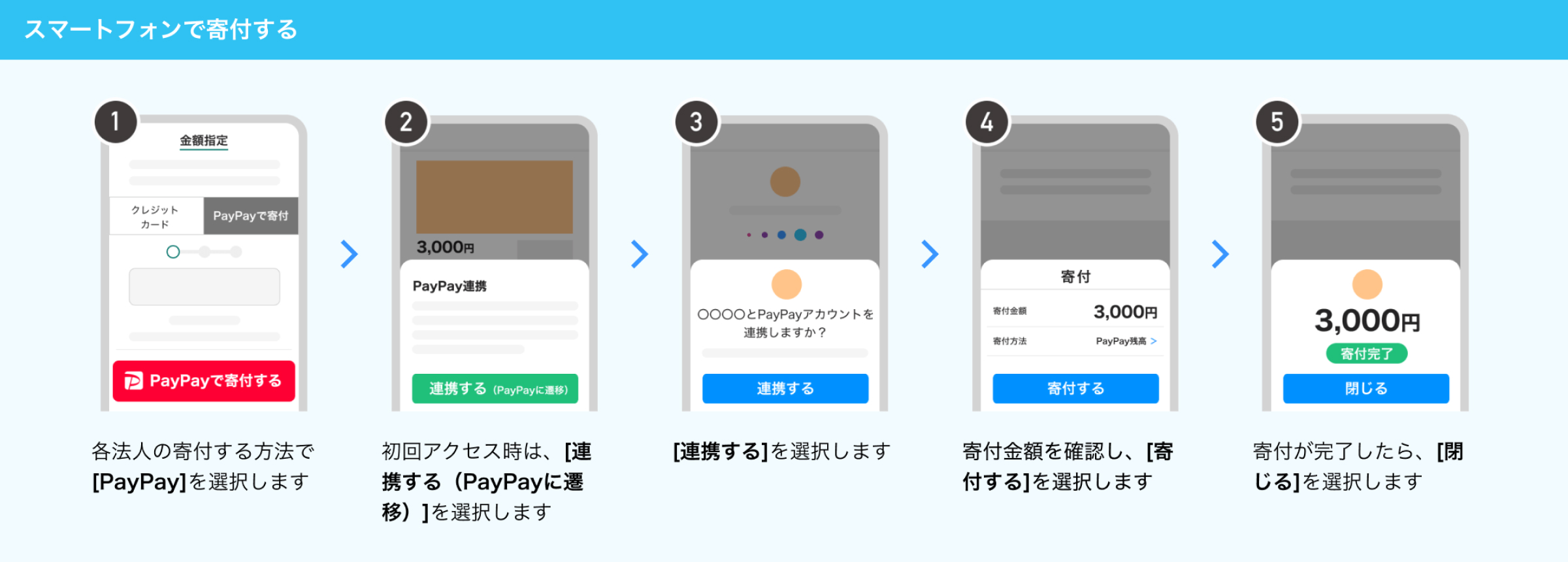
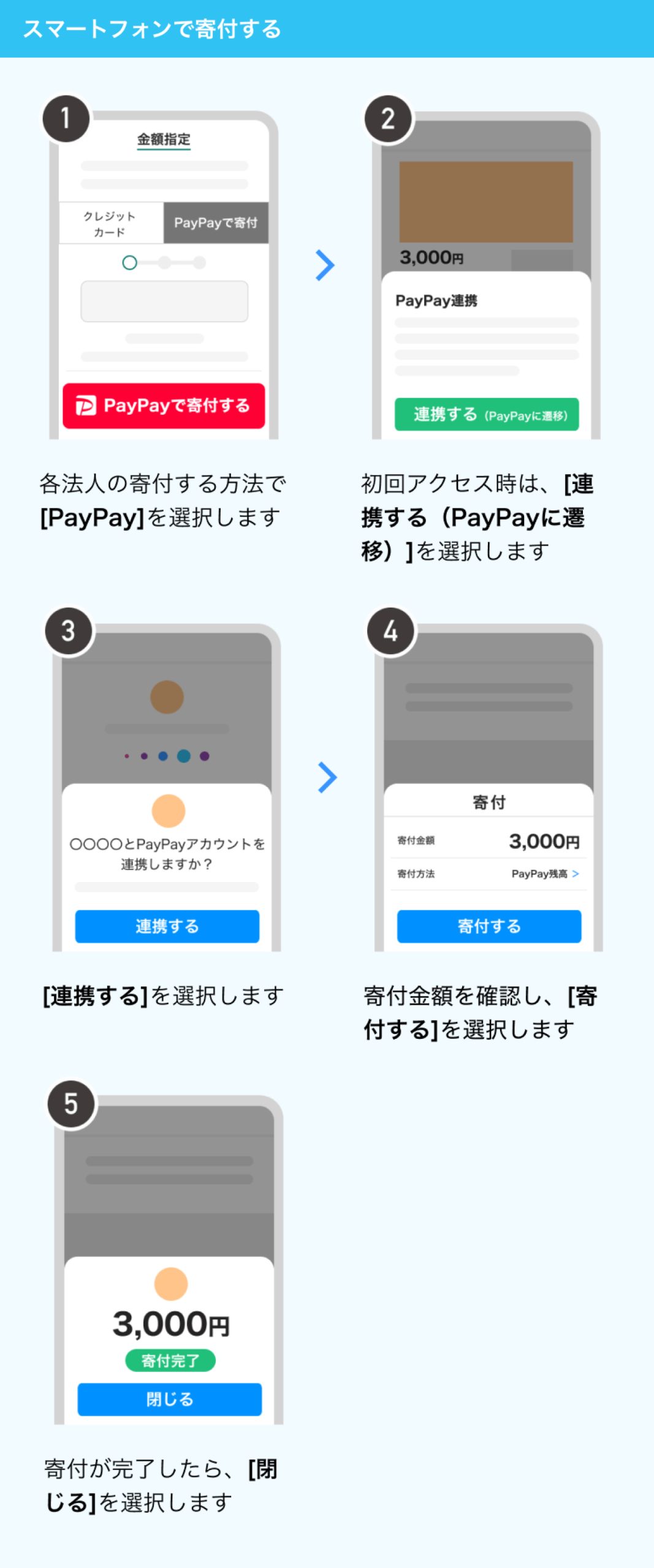
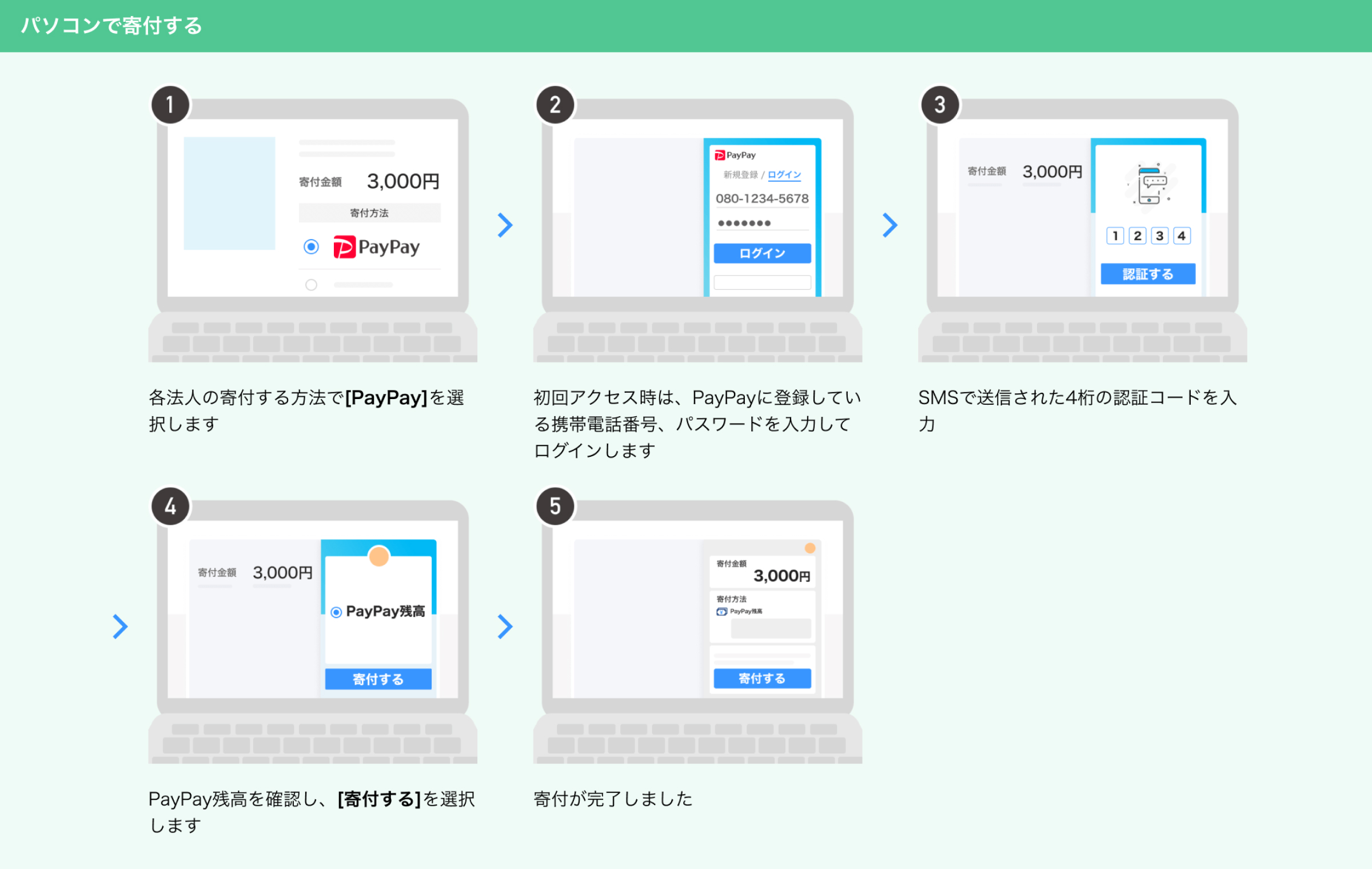

<National university corporations and educational corporations scheduled to adopt PayPay>
*In order of start date

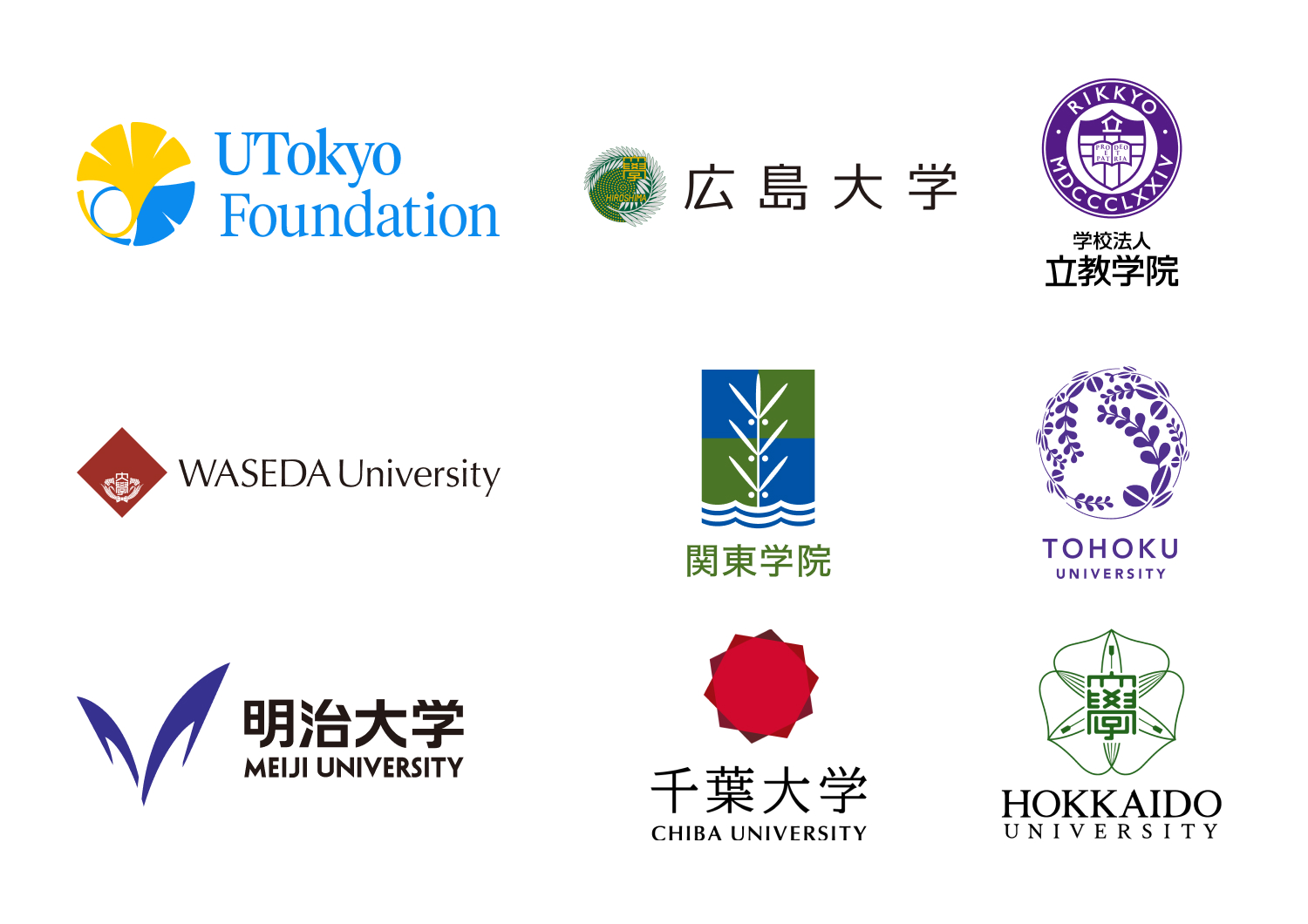
| University name | Legal name | Donation website | When PayPay will be supported |
|---|---|---|---|
| The University of Tokyo | National University Corporation The University of Tokyo | https://utf.u-tokyo.ac.jp/ | October 31, 2024 |
| Hiroshima University | National University Corporation Hiroshima University | https://www.hiroshima-u.ac.jp/yakudou | November 18, 2024 |
| Rikkyo University | Rikkyo Educational Corporation | https://www.rikkyo.ac.jp/donations/ | November 18, 2024 |
| Waseda University | Waseda University Educational Corporation | https://kifu.waseda.jp/ | Early December 2024 |
| Kanto Gakuin University | Kanto Gakuin Educational Corporation | https://kifu.kanto-gakuin.ac.jp/ | Mid-December 2024 |
| Tohoku University | National University Corporation Tohoku University | https://www.kikin.tohoku.ac.jp/ | Mid-December 2024 |
| Meiji University | Meiji University Educational Corporation | https://www.meiji.ac.jp/bokin/index.html | Mid-December 2024 |
| Chiba University | National University Corporation Chiba University | https://kikin.chiba-u.ac.jp/ | December 2024 |
| Hokkaido University | National University Corporation Hokkaido University | https://www.hokudai.ac.jp/fund/ | December 2024 |
※横にスクロールできます
*The indicated dates are subject to change without advance notice. For further details on conditions, refer to each university’s website.
~The University of Tokyo’s donation payment screen~
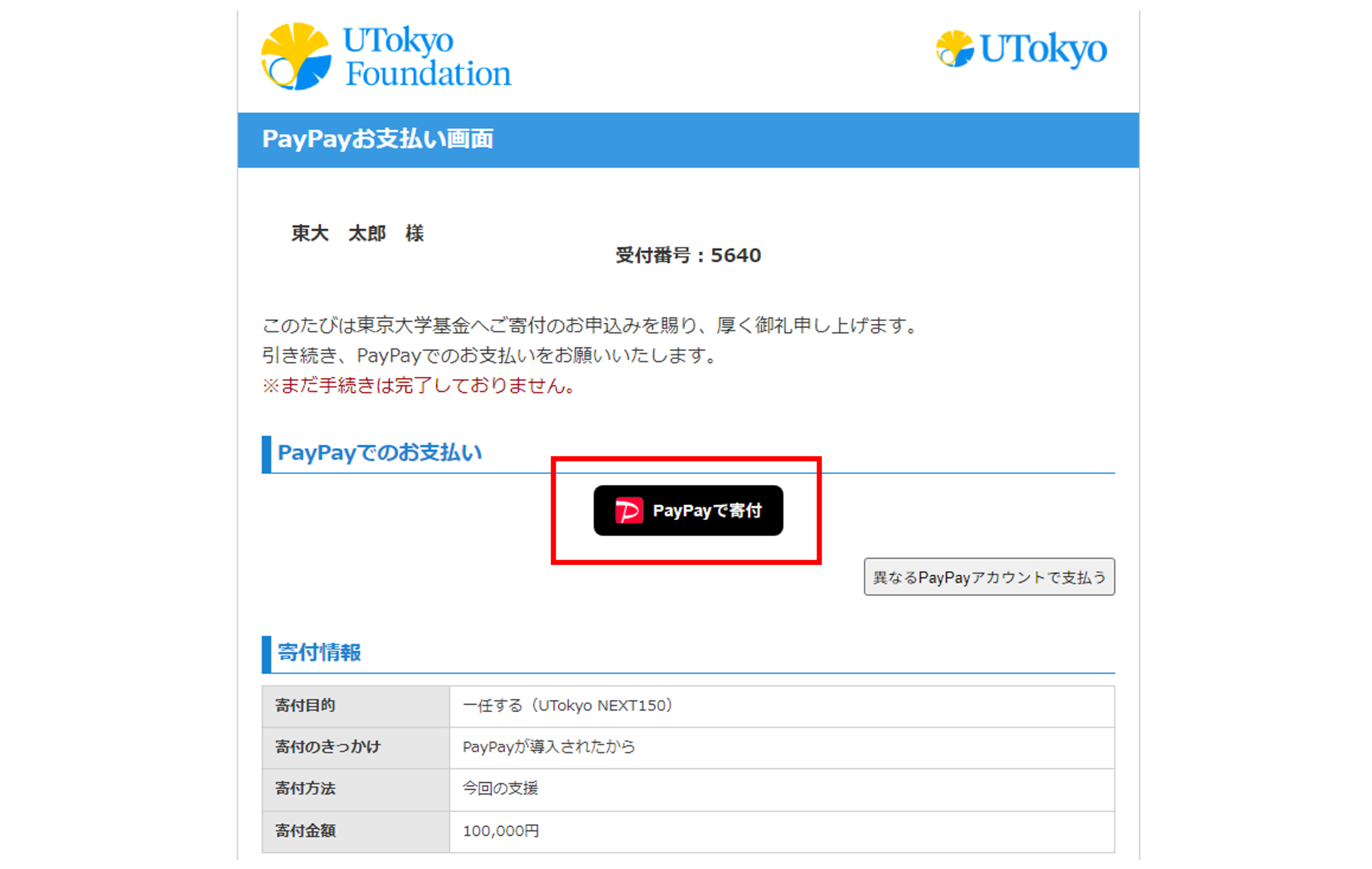
The University of Tokyo and Waseda University have also provided the following comments on the introduction of PayPay for national university corporation and educational corporation donation payments.
<The University of Tokyo>
As The University of Tokyo approaches its 150th anniversary in 2027, it seeks donations for various purposes to maintain autonomous and creative activities for the next 150 years. These includes research, talent development, international exchange, sports, and scholarships for students requiring financial assistance. The collaboration with PayPay marks an effort to increase awareness and garner support for the university’s initiatives.
<Waseda University>
Waseda University raises funds to meet diverse support needs, such as educational and research projects, campus development, scholarships, cultural and artistic activities, and sports support, to cultivate students who contribute globally. The collaboration with PayPay, which has spearheaded cashless initiatives in Japan, aims to make donations more accessible and convenient, with the hope that support will broadly contribute to the development of the university and students who will define the future.
PayPay will continue to expand the use of business accounts, aiming to evolve into an app that is convenient not only for individuals but businesses and educational institutions as well.
PayPay Corporation is registered as follows:
・Prepaid Payment Instruments (third party type) Issuer (Registration number: Director-General of the Kanto Finance Bureau, No. 00710 / Registration date: October 5, 2018)
・Business Operator that Concludes Contracts on the Handling of Credit Cards (Registration number: Kanto (Ku) No. 106 / Registration date: July 1, 2019)
・Telecommunications Carrier (Filing number: A-02-17943 / Date filed: July 2, 2019)
・Fund Transfer Operator (Registration number: Director-General of the Kanto Finance Bureau, No. 00068 / Registration date: September 25, 2019)
・Notified Entity Entrusted with Intermediation (Filing number: C1907980 / Date filed: December 18, 2019)
・Bank Agency Services (License: Director-General of the Kanto Finance Bureau (Gindai) No. 396 / Registration date: November 26, 2020)
・Financial Instruments Intermediary Services (Registration number: Kanto Finance Bureau Director (Kinchu) No. 942 / Registration date: June 25, 2021)
・Electronic Payment Agency Services (License: Director-General of the Kanto Finance Bureau (Dendai) No. 109 / Registration date: February 14, 2023)
・Designated Funds Transfer Operator, permitted to provide digital payment of wages (Designation No.: Minister of Health, Labor and Welfare No. 00001 / Date of designation: August 9, 2024)
・Japan Payment Service Association (https://www.s-kessai.jp/, Date of admission: September 12, 2018)
・Japan Consumer Credit Association (https://www.j-credit.or.jp/, Date of admission: July 1, 2019)
* “PayPay” offers four types of electronic money and other services: PayPay Money, PayPay Money Lite, PayPay Points, and PayPay Gift Vouchers.
PayPay Money can be used to pay for partner services and merchants if it is within the amount deposited into the PayPay account opened after completing an identity verification process. It can also be used for sending and receiving money between PayPay users free of charge. PayPay Money can also be cashed out to a designated bank account (no withdrawal fee if using PayPay Bank). The legal nature of this is an electromagnetic record which can be used to pay for goods and services, can be remitted or cashed out, and is issued by PayPay who is a Fund Transfer Operator registered under Article 37 of the Payment Services Act. PayPay Money (Paycheck) refers to PayPay Money that can only be purchased with wages received by the PayPay user in their Paycheck Account. Based on the provisions of Article 43 of the Payment Services Act, PayPay protects the debt it owes to its users by depositing assets equivalent to or higher than the debt amount. PayPay Money Lite is an electronic money issued by PayPay, which can be purchased and used to pay for services and merchants. PayPay users can transfer and receive PayPay Money Lite free of charge. The legal nature of this is a prepaid payment instrument issued by PayPay (Article 3, Paragraph 1 of the Payment Services Act). Based on the provisions of Article 14 of the Payment Services Act, PayPay preserves the relevant assets for the purpose of protecting the owners of the prepaid payment instrument by providing a security deposit for issuance to the Legal Affairs Bureau in an amount that is half or more of the unused balance of prepaid instrument methods as of March 31 and September 30. In addition, PayPay Points, which are granted through campaigns and promotions when using PayPay, can be used for partner services and in transactions at merchants in addition to PayPay Money and PayPay Money Lite. However, it cannot be transferred to other users or cashed out. PayPay Gift Voucher is a type of electronic money issued by PayPay, which can be used to make payments for affiliated services and merchants designated by the PayPay Gift Voucher. However, it cannot be transferred to other users or cashed out. PayPay Gift Vouchers have an expiration date, after which they will no longer be valid. The deadline for Gift Vouchers can be confirmed in the details or specifications of the measure or promotion campaigns for which they are issued.
PayPay also strives to create a safe and secure environment for users. If an unexpected payment is made by a third party using a PayPay account, or if a request to settle a payment suddenly arrives from PayPay to a user that does not have a PayPay account, there is a scheme that ensures compensation for the damages suffered (the difference will be provided as compensation if compensation is also provided by a third party), given that the prescribed conditions are met. Please see “Applying for compensation” for details.
*Company names, trade names, and products/services in this press release are registered trademarks or trademarks of their respective companies.





